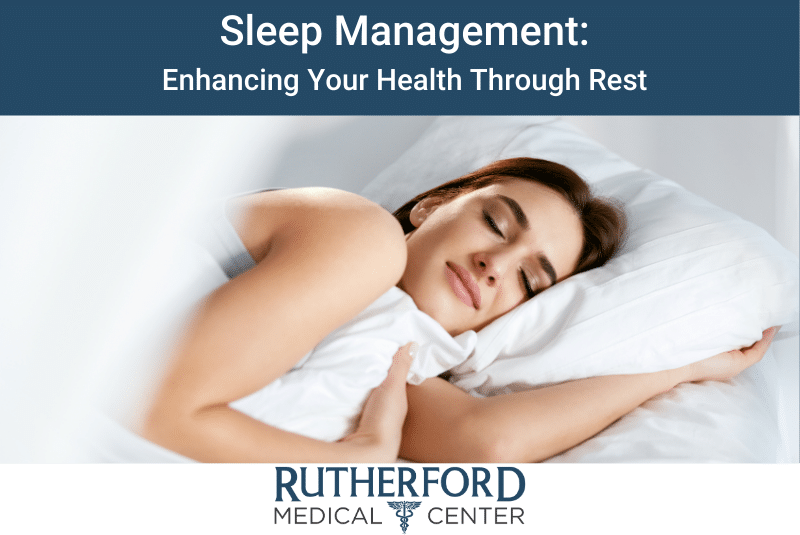November 1, 2025
 At Rutherford Medical Center, we understand that quality sleep is a cornerstone of overall well-being. Sleep plays an essential role in physical health, emotional stability, and cognitive function. However, many people struggle with sleep disorders or habits that interfere with proper rest, which can lead to a variety of health complications. In this blog post, we will explore the importance of sleep management and provide guidance on how to improve sleep quality.
At Rutherford Medical Center, we understand that quality sleep is a cornerstone of overall well-being. Sleep plays an essential role in physical health, emotional stability, and cognitive function. However, many people struggle with sleep disorders or habits that interfere with proper rest, which can lead to a variety of health complications. In this blog post, we will explore the importance of sleep management and provide guidance on how to improve sleep quality.
Why is Sleep Important?
Sleep is crucial for the body’s ability to repair and restore itself. During sleep, the brain consolidates memories, the immune system strengthens, and cellular repair takes place. Without enough sleep, people are at increased risk of developing conditions such as heart disease, diabetes, obesity, and depression. Sleep deprivation also impairs judgment, reaction time, and mood, all of which can impact daily life and long-term health.
Common Sleep Disorders
Understanding common sleep disorders is the first step in recognizing whether you need medical intervention. Below are some of the most prevalent sleep disorders:
- Insomnia: Difficulty falling or staying asleep, which can be acute (short-term) or chronic.
- Sleep Apnea: Breathing repeatedly stops and starts during sleep, often leading to loud snoring and daytime fatigue.
- Restless Leg Syndrome (RLS): An overwhelming urge to move the legs, usually in the evening, making it hard to fall asleep.
- Narcolepsy: A chronic condition characterized by overwhelming daytime drowsiness and sudden attacks of sleep.
- Circadian Rhythm Disorders: Problems with the sleep-wake cycle, such as difficulty adjusting to changes in schedule or time zones.
How to Improve Sleep Hygiene
Sleep hygiene refers to the habits and practices that promote quality sleep. Good sleep hygiene can help prevent sleep disorders and improve the quality of sleep. Here are some tips for better sleep:
- Maintain a Regular Sleep Schedule: Going to bed and waking up at the same time every day helps regulate your body’s internal clock.
- Create a Relaxing Bedtime Routine: Engage in calming activities such as reading, meditation, or warm baths before bed.
- Limit Exposure to Blue Light: Avoid screens (phones, tablets, and computers) at least one hour before bed as blue light interferes with melatonin production.
- Watch What You Eat and Drink: Avoid heavy meals, caffeine, and alcohol close to bedtime.
- Optimize Your Sleep Environment: Make your bedroom conducive to sleep by keeping it cool, quiet, and dark. Comfortable bedding and supportive mattresses also play an important role in sleep quality.
- Exercise Regularly: Physical activity during the day can promote better sleep, but try to avoid exercising right before bedtime.
When to Seek Help for Sleep Problems
If improving your sleep hygiene does not alleviate your sleep issues, or if you are experiencing any symptoms of sleep disorders (such as excessive daytime sleepiness, loud snoring, or difficulty staying asleep), it may be time to consult with a healthcare professional. At Rutherford Medical Center, our specialists are trained to diagnose and treat sleep disorders through various methods, including lifestyle changes, medications, or therapies like Continuous Positive Airway Pressure (CPAP) for sleep apnea.
Comprehensive Q&A on Sleep Management
Q: How much sleep do I really need?
A: The amount of sleep required can vary depending on age and individual needs. Generally, adults need 7-9 hours of sleep per night, while children and teenagers may require more. Some people may feel well-rested with 6 hours, while others may need up to 10 hours for optimal function.
Q: What are the signs that I may have a sleep disorder?
A: Common signs include difficulty falling asleep, frequent awakenings during the night, loud snoring, daytime fatigue, irritability, and difficulty concentrating. If these symptoms persist despite good sleep hygiene, it may be indicative of an underlying sleep disorder.
Q: Can naps help if I’m not getting enough sleep at night?
A: Short naps (20-30 minutes) can help improve mood, alertness, and performance. However, long naps or naps taken late in the day can interfere with your nighttime sleep.
Q: Is it safe to use sleep medications?
A: Sleep medications may be appropriate for short-term use in certain circumstances, but they are not usually recommended for long-term treatment due to potential dependency and side effects. It’s important to discuss with your doctor before starting any medication.
Q: How is sleep apnea treated?
A: Sleep apnea is commonly treated with CPAP therapy, which involves wearing a mask over the nose or mouth during sleep. The mask delivers continuous air pressure to keep airways open. In some cases, lifestyle changes or surgery may be recommended.
Q: Can improving my diet help with sleep?
A: Yes, certain dietary changes can improve sleep quality. Foods rich in magnesium (like leafy greens and almonds), tryptophan (such as turkey and eggs), and melatonin (like tart cherries) can promote better sleep. Avoiding caffeine and heavy meals before bed is also beneficial.
Q: Can stress affect sleep?
A: Absolutely. Stress and anxiety are common causes of insomnia and other sleep disorders. Developing relaxation techniques such as mindfulness meditation, yoga, or deep breathing exercises can reduce stress and improve sleep.
Contact Rutherford Medical Center
If you are experiencing sleep problems or have concerns about your sleep health, Rutherford Medical Center is here to help. Our team of sleep specialists offers comprehensive evaluations and personalized treatment plans to improve your sleep quality.
Rutherford Medical Center
12755 Century Dr, Suite A
Invest in your health today by prioritizing your sleep. Call us to schedule an appointment and begin your journey to better rest and overall wellness.
